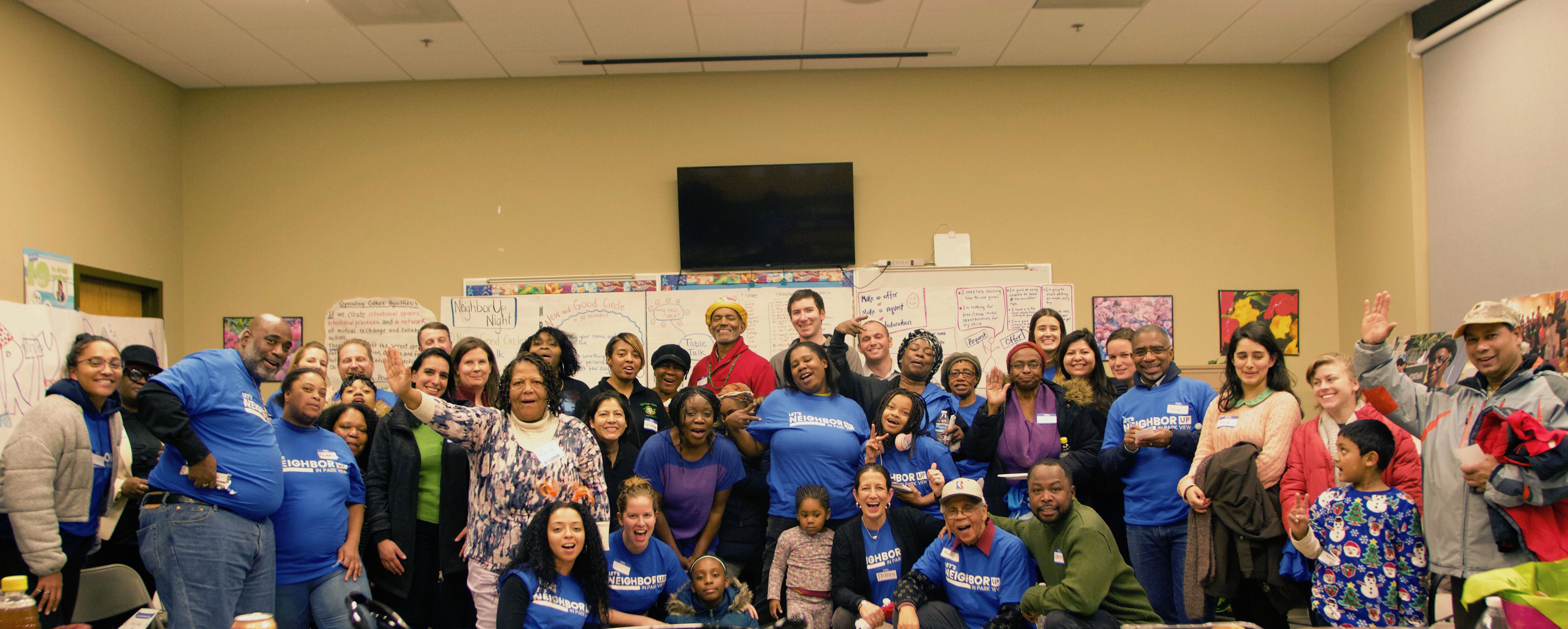Membership Engagement | Five minutes with New Communities Initiative

NCI’s “Neighbor Up,” a network of individuals who care about equitable development of our neighborhoods, particularly those around public housing.
HAND members are on the move! In an effort to highlight the great work that our membership is doing, we have launched a series titled, “Five Minutes with” – an informal conversation with our members on their recent projects and the affordable housing industry. In the latest edition, we caught up with Angie Rodgers, the Director of the New Communities Initiative in DC’s Office of the Deputy Mayor for Planning & Economic Development (DMPED). Check out our conversation here:
HAND: Why is affordable housing important to you?
AR: I have both personal and professional reasons. I grew up (for the most part) in public housing in Memphis, TN. We didn’t start out there, but my mom went through what a lot of women go through. She separated from my stepfather, and he had been the primary breadwinner. Public housing provided us with decent, safe and affordable housing while my mom got fully back into the workforce. Not having to worry about where we were going to live gave her the space to get us back on track. It’s important to me that other families have that opportunity to stabilize and then grow, the way my family did. We went from living in public housing to a house that we owned.
Fast forward about 15 years, and I’m working at the DC Fiscal Policy Institute, where I started out doing research on general income and poverty trends for DC households. I was looking at census data, and how much extremely-low income households – those making roughly less than $25K a year – spent on their housing costs. I was floored by the number of families spending not just 50 percent of their income on their housing costs (which is the threshold for being defined as severely housing-burdened), but by so many who were spending 70, 80 and even 90 percent of their income on housing costs. I thought, “this is what’s hurting poor families,” because how can you focus on improving your health, education, savings or reaching any life goals if where you’re going to live is constantly up in the air? Those families are in survival mode, and if we want them and their kids to do better, we have to focus on stabilizing this very basic factor – where they live.
I’ve been working on affordable housing in some capacity (research, policy, advocacy, grants/philanthropy, and development) ever since.
HAND: What recent accomplishment(s) is your organization extraordinarily proud of?
AR: I’m most proud of three things: (1) We have significant movement on development in all four NCI neighborhoods that did not exist before. I’m particularly proud of our plans for the Park Morton development (Georgia Avenue NW) and Lincoln Heights/Richardson Dwellings (Deanwood area) where we’ve been able to craft plans to redevelop without involuntary displacement from those neighborhoods. They will be national models that counter the long history of public housing redevelopments where neighborhood change often comes at the expense of displacing long-term residents. (2) We developed a platform that we call “100% Resident Success,” which is all about providing a path to success for every resident in an NCI neighborhood, no matter where they ultimately choose to live. It has provided an important framework for us to challenge ourselves and our partners to respond differently to the residents we effect, to define what success means, and to measure whether we are meeting our mark. (3) Last year we launched “Neighbor Up,” a network of individuals who care about equitable development of our neighborhoods (particularly the ones around public housing). Lots of people are talking about community building in “third spaces;” we are actually doing it! We launched a citywide network – Neighbor Up DC; we’ve also launched neighborhood specific networks around the Park Morton development (Neighbor Up Park View) and around Lincoln Heights/Richardson Dwellings (Neighbor Up Marvin Gaye).
HAND: Have you run into any challenges over the last several months? How did you and your team overcome them? What lesson(s) did you learn?
AR: Oh, where to start! We run into many hurdles; too numerous to count or detail in this space. A lot of what we’re doing at NCI is challenging the way our partners do business – from planning to financing to lease up – so that’s difficult. My overall lesson (for myself and my team) is that if you are going to challenge, you have to give your partners the time and space to catch up. The point is not to set them up for failure; the point is not to embarrass them; the point is not to be antagonistic. The point is for all of us to win in the end. But someone has to be the one pushing, and right now that’s us.
HAND: What are you and your colleagues looking forward to?
AR: We spent the last 2 ½ years planning and challenging ourselves to look at our work differently. This year marks the beginning of a lot of implementation. We’re looking forward to that!
HAND: What do you enjoy most about your work and why?
AR: I like tough problems, and I like tackling questions to which others thought there were no good answers. When I took the job at DMPED to run NCI, I had been grappling for a while with this question of how to make the industry provide better housing options and more housing choice for extremely low-income households. Traditional public housing has been declining for decades, and our major affordable housing tool (LIHTC) often hits at a slightly higher income band. I view NCI as an opportunity to tackle this tough question, and to see if I can stumble on better answers than the ones we currently have. This is what gets me out of bed in the morning.
HAND: What do you wish that you could change about our industry?
AR: I would change two things, and they are related. (1) We need better policies, tools and practices to respond to housing challenges for extremely-low income households. We have some resources and strategies if a household is in crisis, but not as many for the vast majority whose main challenge is just that they don’t earn enough. Our answer for those households seems to be to push them to earn more money. This isn’t a bad thing, but as a single strategy it ignores all of the roadblocks these families face (in health, education, criminal justice, and social/economic policies that support inequality) on their quest for higher incomes. This leads to my second point: (2) Our industry needs to be better educated about how all of these things tie together and affect housing choice so that we can respond better to extremely low-income households. Because NCI focuses on public housing residents, we spend a lot of time thinking about these linkages, and how to use our influence as the main gap funder on our deals to encourage partners to respond better. We were proud to support the DC Housing Authority in instituting a policy that says if a household is eligible for public housing, they will be eligible for new NCI units. Lots of people said that we would never close a tax credit deal with that criteria; critics said it was too…generous. We closed our first deal under the new policy about 9 months later, and that building will begin lease-up this spring.
We all operate by rules, guidelines and practices that we need to begin to question – Are there changes I can make so that my product responds better to low-income households?
HAND: If you could describe your work in one word, what would it be?
AR: Necessary.





Leave a Reply
Want to join the discussion?Feel free to contribute!